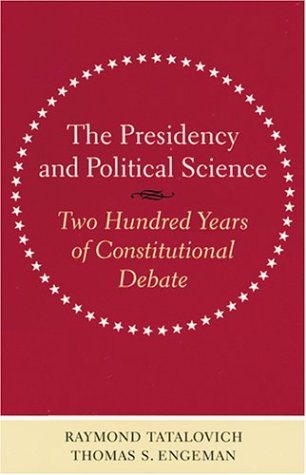Interpreting American Politics
1 total work
The Presidency and Political Science
by Raymond Tatalovich and Thomas S. Engeman
Published 29 July 2003
This is the first book to survey the intellectual history of presidential scholarship from the Founding to the late 20th century. Reviewing the work of over sixty thinkers, including Alexander Hamilton, Thomas Jefferson, Woodrow Wilson, Richard Neustadt, James McGregor Burns, and Theodore Lowi, the authors identify six central questions, the answers to which can help form a theory of presidential power: * Does presidential power derive from the prerogatives of office or from incumbency?* Does presidential influence depend upon force of personality, rhetorical leadership, or partisanship?* Does presidential leadership depend upon historical context or is regime-building manifested through political, institutional, and constitutional developments?* Does presidential leadership vary between domestic and foreign affairs?* Does the president actively or passively engage the legislative process and promote a policy agenda?* Does the organization of the executive branch service presidential leadership?
Arguing that three paradigms have dominated the history of presidential scholarship-Hamiltonianism, Jeffersonianism, and Progressivism-the authors conclude that today's understanding of the presidency is characterized by a "new realism and old idealism." This book will appeal to students and scholars as well as to general readers with an interest in the American presidency.
Arguing that three paradigms have dominated the history of presidential scholarship-Hamiltonianism, Jeffersonianism, and Progressivism-the authors conclude that today's understanding of the presidency is characterized by a "new realism and old idealism." This book will appeal to students and scholars as well as to general readers with an interest in the American presidency.
